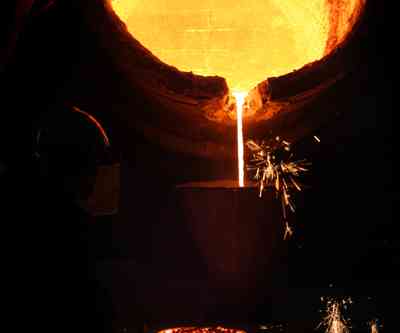 (Washington, D.C.) (February 12, 2016) – AK Steel Corporation, ATI Flat Rolled Products, North American Stainless, and Outokumpu Stainless USA, LLC, the four principal U.S. producers of stainless steel sheet and strip, filed antidumping and countervailing duty petitions today charging that unfairly traded imports of stainless steel sheet and strip from the People’s Republic of China (“China”) are causing material injury to the domestic industry. The antidumping margins alleged by the domestic industry range from 53.69 percent to 83.24 percent ad valorem. The domestic industry’s countervailing duty petition alleges that the Chinese government has provided significant subsidies to Chinese producers. The petitions were filed concurrently with the United States Department of Commerce (“Commerce Department”) and the United States International Trade Commission (“USITC”).
(Washington, D.C.) (February 12, 2016) – AK Steel Corporation, ATI Flat Rolled Products, North American Stainless, and Outokumpu Stainless USA, LLC, the four principal U.S. producers of stainless steel sheet and strip, filed antidumping and countervailing duty petitions today charging that unfairly traded imports of stainless steel sheet and strip from the People’s Republic of China (“China”) are causing material injury to the domestic industry. The antidumping margins alleged by the domestic industry range from 53.69 percent to 83.24 percent ad valorem. The domestic industry’s countervailing duty petition alleges that the Chinese government has provided significant subsidies to Chinese producers. The petitions were filed concurrently with the United States Department of Commerce (“Commerce Department”) and the United States International Trade Commission (“USITC”).
The domestic industry filed its petitions for relief in response to large and increasing volumes of low-priced imports of stainless steel sheet and strip from China over the past three years that have injured U.S. producers. The volume of imports of stainless steel sheet and strip from China has increased by 133 percent since 2013. Chinese products accounted for 81.2 percent of the total increase in U.S. stainless steel sheet and strip imports during the past three years. The petition alleges that Chinese producers have injured the domestic industry by selling their stainless steel sheet and strip at unfairly low prices that significantly undercut domestic market prices. As a result of this unfair competition, the domestic industry has suffered declines in sales, production, employment, prices, and profits. Chinese producers have massive capacity to produce stainless steel sheet and strip and have been exporting large and increasing volumes of unfairly low-priced and subsidized merchandise to the United States that have devastated conditions in the U.S. market. Those price declines are likely to continue to the detriment of U.S. producers if duties are not imposed to level the playing field. U.S. producers have invested significant capital in recent years to enhance capability, quality, and cost competitiveness and are not earning an adequate rate of return on invested capital.
“Surging imports of unfairly low-priced stainless steel sheet and strip from China have devastated pricing in the U.S. market and caused severe injury to the domestic industry,” commented Kathleen W. Cannon, of Kelley Drye & Warren LLP, the petitioners’ trade counsel. “The domestic industry looks forward to the opportunity to present its case to the Commerce Department and U.S. International Trade Commission to obtain relief from unfairly traded imports from China and to restore fair competition in the U.S. market.”
Antidumping duties are intended to offset the amount by which a product is sold at less than fair value, or “dumped”, in the United States. The margin of dumping is calculated by the Commerce Department. Estimated duties in the amount of the dumping are collected from importers at the time of importation. Countervailing duties are intended to offset unfair subsidies that are provided by foreign governments and benefit the production of a particular good. The USITC, an independent agency, will determine whether such imports are a cause of, or threaten, material injury to the domestic industry.
As a result of the filing of the petitions, the Commerce Department will determine whether to initiate the antidumping and countervailing duty investigations within 20 days and the USITC will reach a preliminary determination of material injury or threat of material injury within 45 days. The entire investigative process will take approximately one year, with final determinations of dumping, subsidization, and injury likely occurring in the first quarter of 2017.
Stainless steel sheet and strip is an alloy steel containing, by weight, 1.2 percent or less of carbon and 10.5 percent or more of chromium, with or without other elements. Stainless steel sheet and strip is used in consumer and industrial applications where the corrosion resistance, heat resistance, or design characteristics of stainless steel are required.
The petitioners are represented in these actions by Kathleen W. Cannon, David A. Hartquist, and John M. Herrmann of the law firm Kelley Drye & Warren LLP.
